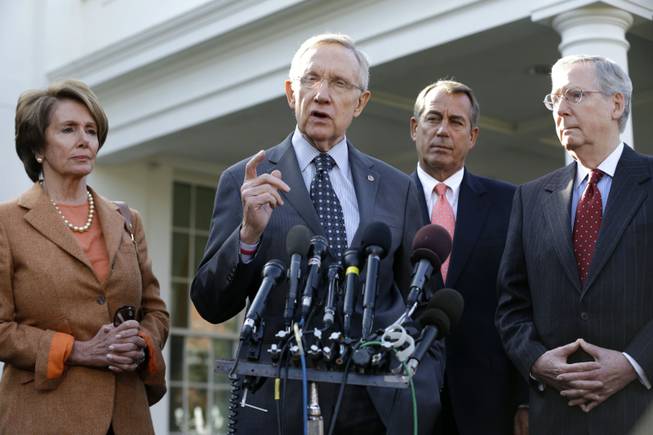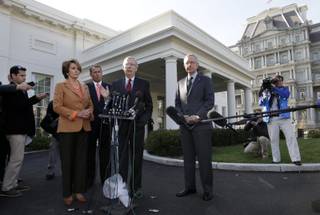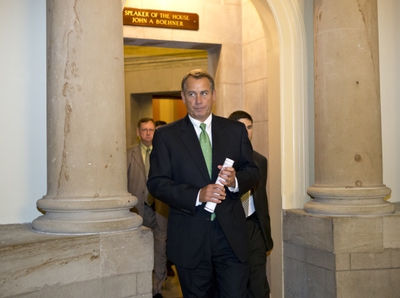
Jacquelyn Martin / AP
Senate Majority Leader Harry Reid of Nev., second from left, accompanied by, from left, House Minority Leader Nancy Pelosi of Calif., House Speaker John Boehner of Ohio and Senate Minority Leader Mitch McConnell of Ky., gestures as he speaks to reporters outside the White House in Washington, Friday, Nov. 16, 2012, following a meeting with President Barack Obama to discuss the economy and the deficit.
Wednesday, Dec. 19, 2012 | 2 a.m.
Related stories
- A practical guide to the fiscal cliff: What it could mean for your taxes (12-19-2012)
- Boehner pitches Republicans tax options to avoid ‘fiscal cliff’ (12-18-2012)
- Narrow ‘fiscal cliff’ bargain gains currency (12-18-2012)
- Congress may work through holidays to avert ‘fiscal cliff’ (12-17-2012)
- As fiscal cliff nears, Reid says Democrats are gaining ground (12-13-2012)
- Night talks: Obama, Boehner meet on ‘fiscal cliff’ (12-13-2012)
- More Sun political news
In the past few weeks, the road to a "fiscal cliff" deal basically has boiled down to a series of negotiations and counteroffers between President Barack Obama and House Speaker John Boehner.
But it may be Senate Majority Leader Harry Reid who has the last say over what fiscal plan advances in Congress — even if none of the proposals they are considering are quite the deal he might have made.
For months, Reid has been stumping for a Senate-passed bill that would extend income tax cuts up to $250,000, allowing rates for incomes above that level to rise back to their 1990s levels. Democrats have been claiming they have a mandate for imposing that threshold, which has been a matter of contention between the parties for two years, after making gains in the 2012 election.
But at this stage, the two proposals sitting on the table have higher thresholds. Obama proposed a detailed fiscal cliff package with a $400,000 ceiling for tax cut extensions while Boehner countered with a comparatively simpler plan that capped tax cut extensions at $1 million.
Reid immediately shot down Boehner’s proposal as a nonstarter that “cannot pass both Houses of Congress.”
But there’s a problem with Obama’s proposal, too.
The looming fiscal cliff is one part scheduled tax rate hikes, one part scheduled government spending cuts, with the bulk of those levied on defense and security. Both are scheduled to go into effect Jan. 1 and together, economists say, could throw the country back into a second minor recession.
The political stakes surrounding the fiscal cliff are heightened by the fact that soon after it is scheduled to take effect, the president will need the authority to raise the nation’s debt limit.
Alongside the $400,000 tax cut extension ceiling, Obama’s proposal staked out room to let him raise the debt limit enough for the next two years. In exchange, he offered to scale back spending on entitlements — specifically by reconfiguring the payments for Social Security.
Obama would revise the method of calculation for Social Security benefits, replacing the current system with “chained CPI,” a consumer price index model that assumes people start buying cheaper products when their spending is restricted. Obama requested a waiver from that pricing model for the poorest and most dependent on their Social Security benefits.
But the change could still save up to $100 billion over the next 10 years, and many Democrats think that's too much money to make at the expense of a program they have long argued has not contributed to the national debt.
Several Senate Democrats — including Reid’s second-ranking Republican, Dick Durbin — told reporters Tuesday that accepting chained CPI as part of a fiscal cliff might be too much to ask.
There has been no senator more vocal about how off-limits Social Security is than Reid.
“We are not going to mess with Social Security,” he told reporters asking about how entitlements might be manipulated to offset the debt the day after the November election.
On Tuesday, Reid refused to comment specifically about the chained CPI provisions in the president’s offer to Boehner, instead praising Obama for making an overall, good-faith effort.
“This isn’t going to be a situation where we’re going to vote on a particular provision in the bill, it’s going to be a framework to do something about the long-term security of this country,” Reid said when asked about Social Security. “I admire and appreciate very much the president showing the American people how reasonable he’s trying to be. Significant tax increases, significant cuts.”
Reid has not been in the negotiating room with Obama and Boehner, though he has been weighing in and keeping tabs on their progress through frequent contact with the White House and the speaker’s staff.
But his comments about the president’s bill, despite his stance on Social Security, are a sign of how much more closely coordinated the two powerful Democrats have become since the last time Obama and Boehner were holding private negotiations, during the debt ceiling debacle of mid-2011.
“My impression is that Reid is comfortable with Obama’s tough negotiating stance, is kept fully briefed by the White House and has opportunities to flag any components of a potential deal that he finds problematic in the Senate,” said Thomas Mann, a congressional expert with the Brookings Institution.
Signs Tuesday hinted that the process toward a fiscal cliff deal might now be shifting to the Senate.
Boehner told House Republicans he plans to hold two to three votes, as soon as Thursday, on various alternative solutions to avoid the fiscal cliff, which they will present as amendments. One will be the Senate-passed proposal to raise tax rates on income levels above $250,000. Another will certainly be Boehner’s proposal to raise rates only above $1 million. That plan would also, like Obama’s proposal, raise capital gains tax rates from 15 to 20 percent.
Even the million-dollar bill is a marked shift for Republicans, who up until this week were demanding that there be no tax hikes at all.
“They started with, ‘Listen, Barack Obama won the election, so here’s what we’re faced with,’” Nevada Rep. Mark Amodei said, emerging from the first of two meetings House Republicans held Tuesday. “Taxes are going up for sure on the first. The question is: How much and on who?”
The million-dollar bill is very similar to a bill Senate Democrats unanimously voted for in 2010 that would have raised rates only on income levels over $1 million. The proposal was backed at the time by Democrats Sen. Chuck Schumer and then-House Speaker Nancy Pelosi. Ironically, it did not pass the Senate then because no Republicans would vote for it.
But Reid — who said Tuesday afternoon that Boehner had not been in touch with Obama since throwing out the $1 million offer — was adamant Democrats would not support a bill that only raised tax rates on income levels over a million dollars this time.
“Remember, at that time, what we were trying to do is come up with something to stimulate the economy, and remember that at that time, the president took all that away from us when he recommended and advocated that we just continue all the tax cuts,” Reid said, arguing circumstances and stakes had changed since late 2010. “So that came up in an entirely different context than now.
“Everyone should understand, Boehner’s proposal will not pass the Senate. Not even as a last ditch.”
The White House backed Reid on Tuesday: The president’s spokesman echoed Reid within minutes of his shooting down Boehner’s million-dollar bill, saying the proposal could not succeed “because it can’t pass the Senate ... and does little to address our fiscal challenges with zero spending cuts.”
It is not clear yet whether Republicans will hold a third vote on the $400,000-threshold proposal from Obama, and Reid did not predict how or whether it could pass the Senate. But if the House ends up sending only a million-dollar bill back to the Senate, Reid vowed to gut it on arrival.
How he would do it, or what exactly he would replace it with, he didn’t say.
“If he sends that over, we have a number of different alternatives,” Reid said. “I’ve met with my staff and the parliamentarian several times today, and there are different ways we can move forward on that.”



Join the Discussion:
Check this out for a full explanation of our conversion to the LiveFyre commenting system and instructions on how to sign up for an account.
Full comments policy